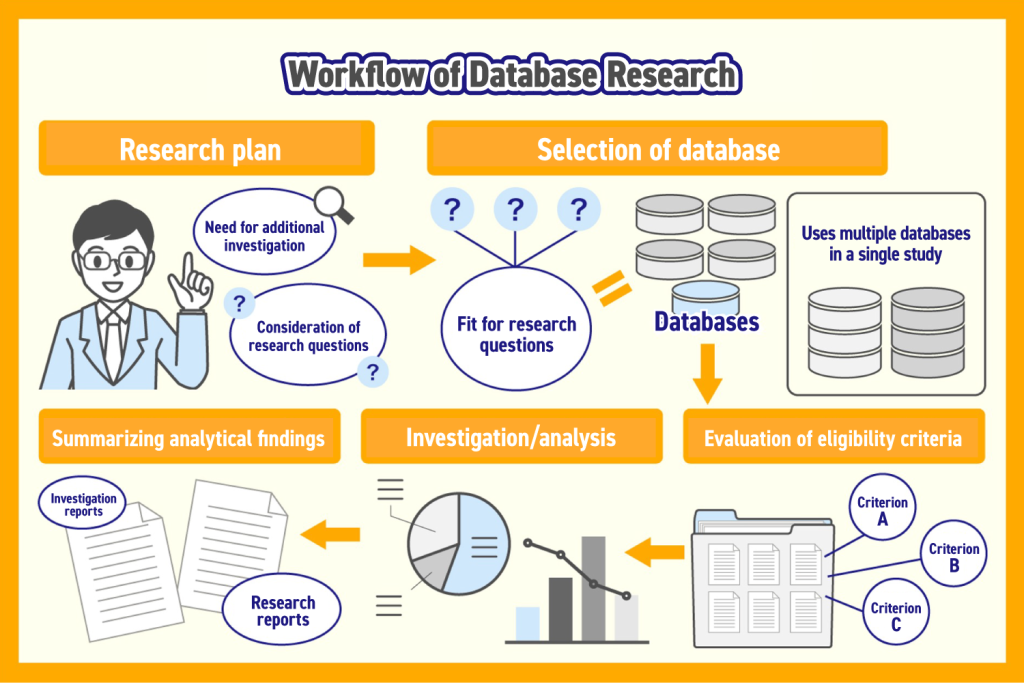Medical database research refers to studies that utilize big data in healthcare collected by medical institutions. This type of research spans a wide range of fields, such as clinical epidemiology and pharmacoepidemiology, and is increasingly used worldwide. This article provides an overview of database research, its objectives, process, and key considerations.
What is Database Research?
As the name suggests, this type of research involves using medical databases. With the cooperation of patients in data collection, medical databases have been utilized in Europe and the United States to investigate pharmaceutical risks.
Medical databases are integrated collections of big data gathered from various healthcare institutions. These databases include information from electronic medical records, ordering systems, and insurance claims, covering data points such as primary diagnoses, comorbidities, gender, age, initial visit dates, consultation dates, and significant medical histories.
Such databases are secondarily utilized by research institutions that require large sample sizes, contributing to more comprehensive and reliable medical research and clinical practice.
Examples of major medical databases include:
- NDB (National Database): Managed by the Ministry of Health, Labour and Welfare.
- MID-NET: A database compiled from data collected at 23 large hospitals across Japan.
- JADER: A database for voluntary reporting of adverse events.
- Medical databases managed by private enterprises or academic research institutions.
Database Research in Japan
In Japan, foundational infrastructure to support database-based studies is still under development. For medical databases to be fully utilized in research, it is crucial to establish appropriate systems and frameworks.
Nevertheless, the growing adoption of electronic medical records has made data more accessible. Databases now often include comprehensive insurance claims and health checkup data. Regulatory frameworks for providing medical data to research institutions are also evolving, raising expectations for further development in this field.
Objectives of Database Research
Medical databases serve as important sources of evidence for fields like clinical epidemiology and pharmacoepidemiology. Traditionally, data collection for such studies has been inefficient, as it is not usually intended for repeated or varied research use.
By contrast, medical databases allow researchers to extract valuable data as needed. For instance, claims data can support both descriptive and analytical epidemiological research.
Applications of medical database research include:
- Development of new drugs
- Post-marketing surveillance
- Evaluation of treatment efficacy in clinical settings
- Information-sharing on rare and intractable diseases
Workflow of Database Research

The typical process for medical database research involves the following steps:
- Research Planning
- Database Selection
- Definition of Eligibility Criteria
- Data Extraction and Analysis
- Interpretation and Reporting
Here is a brief overview of each step:
Research Planning
The first step is to clearly define the research direction. This includes conducting thorough preliminary and literature reviews to refine the research question and determine the need for further investigation.
Database Selection
The chosen database must align with the research question. When possible, in-person meetings are recommended to prevent misunderstandings.
In some cases, multiple databases may be required for a single study, depending on the research objectives.
Definition of Eligibility Criteria
Once a database has been selected, eligibility conditions for extracting data must be established. Common criteria include:
- Primary diagnosis
- Comorbidities
- Gender
- Age
- Date of initial visit
After defining extraction algorithms, researchers should validate them and estimate the number of eligible cases.
Data Extraction and Analysis
Data aggregation and statistical analysis are conducted according to the predefined research and analysis plans. If in-house capabilities are insufficient, external database vendors may be engaged to support these tasks.
Interpretation and Reporting
Based on the analysis, researchers prepare reports or manuscripts for publication. Disseminating research findings through academic channels helps serve the public interest and contributes to the scientific community.
Key Considerations in Database Research
To ensure reliable results in medical database research, several factors must be carefully considered:
Engage Subject-Matter Experts and Statisticians
Access to a high-quality database is not enough to guarantee valid findings. Expertise in data interpretation, epidemiology, and statistics is essential, especially for pharmacoepidemiological studies.
Assess Vendor Expertise
When outsourcing tasks to database vendors, it is important to verify their experience in medical database research.
Not all vendors have the necessary qualifications. Researchers should consult with internal experts to evaluate the suitability of external partners.
Align Database with Research Objectives
Different databases have different characteristics. Researchers must ensure that the selected database is appropriate for their specific research questions.
Using an unsuitable database may lead to invalid results, so feasibility should always be assessed in advance.
The Future of Medical Database Research
Medical database research leverages extensive data collected from various institutions. By extracting and analyzing this information, researchers can generate meaningful evidence for clinical and epidemiological studies. In the future, medical databases will play an even more critical role in academic research and drug development.
Medical Data Vision Co., Ltd. operates one of Japan’s largest medical databases and offers a wide range of services, including web-based tools, ad hoc support, and annual data provisioning. Please feel free to consult us for any research requiring database utilization.




